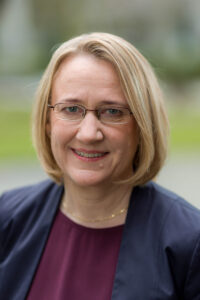Sarah Jones
Significant contributions to the understanding and modelling of tropical systems and extra-tropical transitions and outstanding leadership merits for the benefit of the international community

Sarah Jones, Germany was selected to receive the EMS Silver Medal 2023 in recognition of her significant contributions to the understanding and modelling of tropical systems and extra-tropical transitions, her outstanding leadership merits for the benefit of the European and international community and beyond, and her strong involvement with the Young Earth System Science community.
Silver Medal Lecture: “Early Career Scientists and how they shape our world.”
Sarah Jones is the President of the German Weather Service DWD since August 2023, after having served as Head of the Business Area Research and Development on the DWD Executive Board since 2011.
Sarah Jones has made original and important contributions to the science of predicting and understanding high impact weather, in particularly tropical cyclones, their extratropical transition and tropical-extratropical interactions. She served the European meteorological community in particular by her leading contributions to international research programmes such as THORPEX, PANDOWAE (Predictability and Dynamics of Weather Systems in the Atlantic-European Sector) and the African Monsoon Multidisciplinary Analysis (AMMA). Sarah’s research, and that of her students, have led to improved predictions of high impact weather over Europe through better process understanding and numerical weather prediction modelling, including advancing the use of ensembles.
As chair of the World Weather Research Programme’s (WWRP) Science Steering Committee, she was strongly involved in the High Weather Project (HIWeather). Under Sarah’s influence, Germany has been a strong supporter and research provider in this project, which spans topics from predictability and multi-scale modelling to warning communication, societal impacts, and user-oriented evaluation. HIWeather is the first project within WMO to successfully integrate physical and social science in a meaningful way. Sarah deserves much of the credit for ensuring that the “people side” of weather science was prioritised. Equally, in the framework of the Hans-Ertel Centre for Weather Research, Sarah’s vision to prioritise a programme of social science (WEXICOM – Weather warnings: from EXtreme event Information to COMunication and action) has led to more effective forecasts and warnings for critical stakeholders such as emergency managers, transport, infrastructure, and the public through better risk communication. This was pioneering in its inception and remains one of the few programmes dedicated to applying social science in meteorology.
As chair of the WWRP Scientific Steering Committee she led the development of the widely praised WWRP Strategy and Implementation Plan 2016-2023 with targeted action areas in high impact weather, water, urbanization, and new technologies – and with her strong management kept the programme of work on track.
The increase and enhancement of the public understanding of our science and its applications was and is always an important element of Sarah’s activities. As chair of the WWRP she strongly supported activities such as the organization of the Open Science Conference in Montreal, served as editor for the WMO book “seamless prediction: from minutes to months”, which summarizes the research state in weather and climate science and organized the 2017 meeting of WMO’s Commission of Atmospheric Science (CAS) summit in Geneva.
Last, not least, Sarah is an outstanding role model, especially for women in science. She has mentored younger scientists to achieve, and has actively promoted scientists from developing countries in international activities. As WWRP SSC chair she championed gender and cultural diversity in the SSC and in the working groups, and made a point to develop a strong relationship between the WWRP and the Young Earth System Science (YESS) community.

